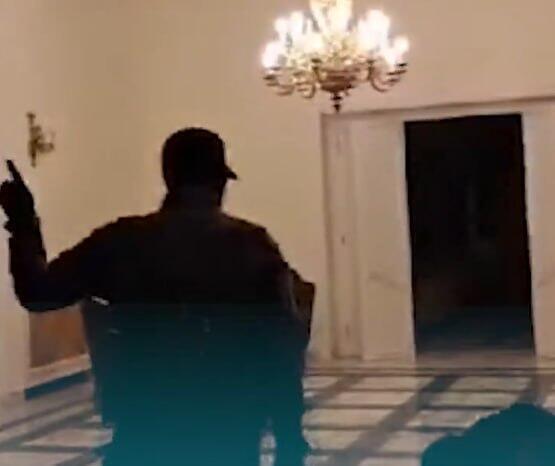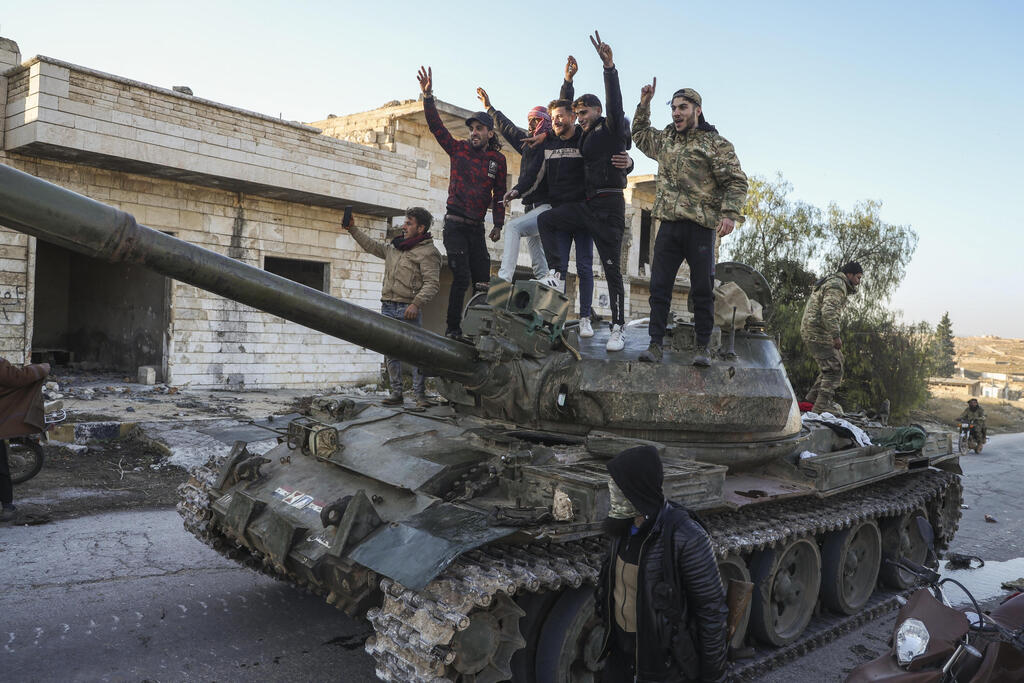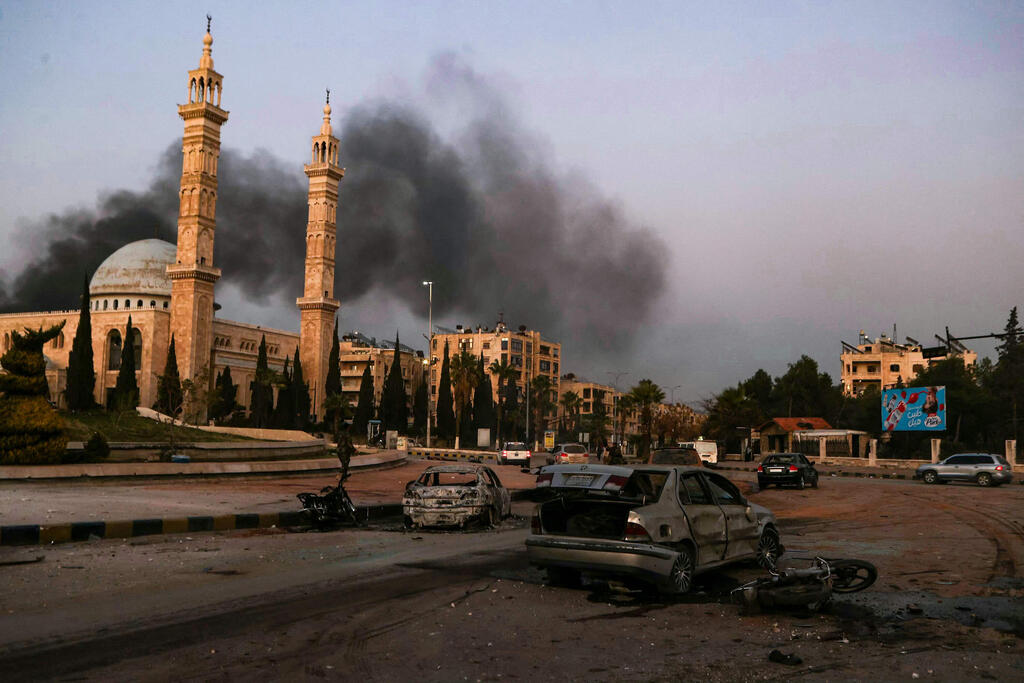Getting your Trinity Audio player ready...
The rebels in Syria announced Sunday afternoon that they had taken over President Bashar Assad's palace in the city of Aleppo, which they occupied over the weekend for the first time since the beginning of the civil war. Assad himself promised in the afternoon to fight back and declared that "terror only understands the language of power, and we will break it with it." Sources in the Syrian army claim that the Syrian forces that were expelled from Aleppo over the weekend are now reorganizing and preparing for a counter-attack to regain control of the city.
It is the first time since the Syrian Civil War erupted in 2011 that Bashar al-Assad’s regime has lost its grip on Aleppo, Syria’s second-largest city. The Syrian opposition confirmed this dramatic shift on Sunday afternoon, marking a critical turning point in the conflict. Reports indicate the rebels, spearheading a surprise offensive against Assad’s forces, have seized key military installations in the city, including the military academy and other southern military colleges. Meanwhile, pro-Iranian militias in Iraq are reportedly contemplating intervention in Syria to bolster Assad’s regime as his grip on the region falters.
Fighting near Aleppo and Idlib
Documentation from Aleppo: Rebels takeover of Assad's palace in the city
The rebels’ sudden and coordinated assault began last Wednesday and coincided with the implementation of the cease-fire between Israel and Hezbollah in Lebanon. Led by Hayat Tahrir al-Sham (HTS) – a Sunni jihadist group that had been largely confined to Idlib province in northwest Syria – rebels rapidly advanced into the neighboring Aleppo region, capturing swaths of territory. Assad’s forces were unable to hold their positions, and by Saturday reports emerged that Aleppo was no longer under regime control.
In recent years, Assad’s regime appeared to have stabilized, thanks to the backing of Russia and Iran, leaving rebel activity largely subdued. The Aleppo offensive marks the largest operation by anti-Assad forces in four years, raising international concerns, particularly in Israel, over the potential for non-conventional weapons to fall into jihadist hands. Over the past five days of intense fighting in northwest Syria, more than 300 people, including dozens of civilians, have reportedly been killed.
By midday Sunday, the Syrian Observatory for Human Rights, a London-based opposition monitoring group, confirmed Aleppo had fallen out of Assad’s control. Rami Abdul Rahman, the group’s director, told AFP the rebels now control almost the entire city, aside from a few Kurdish-held neighborhoods. “This is the first time since the war began in 2011 that Assad has completely lost control of Aleppo,” he emphasized. Rebel sources later claimed that, in addition to capturing the military academy, they had also seized a Russian air defense system.
Turkey’s concerns and Kurdish movements
Regional actors are already recalibrating in response to the power shift. Iran, Assad’s staunch ally, has decried the rebel offensive as part of what it described as a “Zionist-American satanic plot” to destabilize the region. On Sunday, Iranian Foreign Minister Abbas Araghchi traveled to Damascus in a show of solidarity, proclaiming Tehran’s unwavering support for the Syrian government. “The Syrian army will once again defeat these terrorists, as it has in the past,” he declared before departing for Syria.
Meanwhile, reports from the Qatari newspaper Al-Araby al-Jadeed suggest that two pro-Iranian Iraqi militias are deliberating whether to intervene in Syria to assist Assad in reclaiming Aleppo. A spokesperson for Kata'ib Sayyid al-Shuhada ("Masters of Martyrs Battalion"), one of the militias, alleged that “what is happening in Syria with American and Israeli backing is the second phase of the siege on Hezbollah in Lebanon.” He warned that the developments in Syria would inevitably spill over into Iraq, justifying potential intervention.
“We have fought for years in Syria, not to defend the regime, but to protect the resistance axis and the vital supply line connecting Lebanon, Iraq, Iran and Syria,” he explained. While no definitive decision has been made, militia representatives hinted that deployment could occur within days if deemed necessary.
5 View gallery


An Idlib local crying over death of a family member
(Photo: MUHAMMAD HAJ KADOUR / AFP)
Turkey, another key stakeholder in northern Syria, is closely monitoring the situation. For years, Ankara has backed certain rebel factions against Assad, but its primary concern remains the strengthening of Kurdish groups near its border. Turkish security officials claimed on Sunday that rebel forces aligned with Ankara had thwarted an attempt by Kurdish militias to establish a corridor linking Kurdish-controlled areas in northeastern Syria to Tel Rifaat, an area northwest of Aleppo with strategic significance. Turkish sources alleged that Kurdish factions, including the PKK and YPG – both viewed as terrorist organizations by Ankara – sought to exploit the vacuum created by Assad’s retreat. Turkey views such moves as a direct threat to its national security.
Assad’s allies downplay losses
As the rebels consolidate their gains, Assad’s media apparatus has worked to downplay the significance of the developments. Lebanon’s Al-Mayadeen network, which is closely affiliated with Hezbollah, reported on Sunday that the Syrian army had already reclaimed several towns in northern Hama province. The network also dismissed claims that rebels had captured villages in the region. Meanwhile, Syria’s Ministry of Defense has urged citizens to rely exclusively on official channels for updates, underscoring the regime’s attempt to maintain a narrative of control.
A civil war that reshaped the region
The Syrian Civil War, which began in 2011 as part of the broader Arab Spring uprisings, has left an indelible mark on the Middle East. The conflict erupted following anti-Assad protests in the southern city of Daraa, which were met with a brutal crackdown by the regime.
Get the Ynetnews app on your smartphone: Google Play: https://bit.ly/4eJ37pE | Apple App Store: https://bit.ly/3ZL7iNv
By 2015, Assad’s control had dwindled to a fraction of the country, and his government appeared on the verge of collapse. However, a decisive intervention by Russia, coupled with support from Iranian militias and Hezbollah, enabled Assad to regain control over most of Syria.
In recent years, fighting has subsided. Rebels were largely confined to the Idlib region, and Assad’s grip on power seemed unshakable. Yet the Aleppo offensive has rekindled fears of renewed instability. The conflict has exacted a devastating toll, with over half a million people killed and millions displaced, many of whom have sought refuge abroad. Despite Assad’s apparent resurgence, the latest developments underscore that Syria’s war is far from over, and the balance of power remains precarious.








